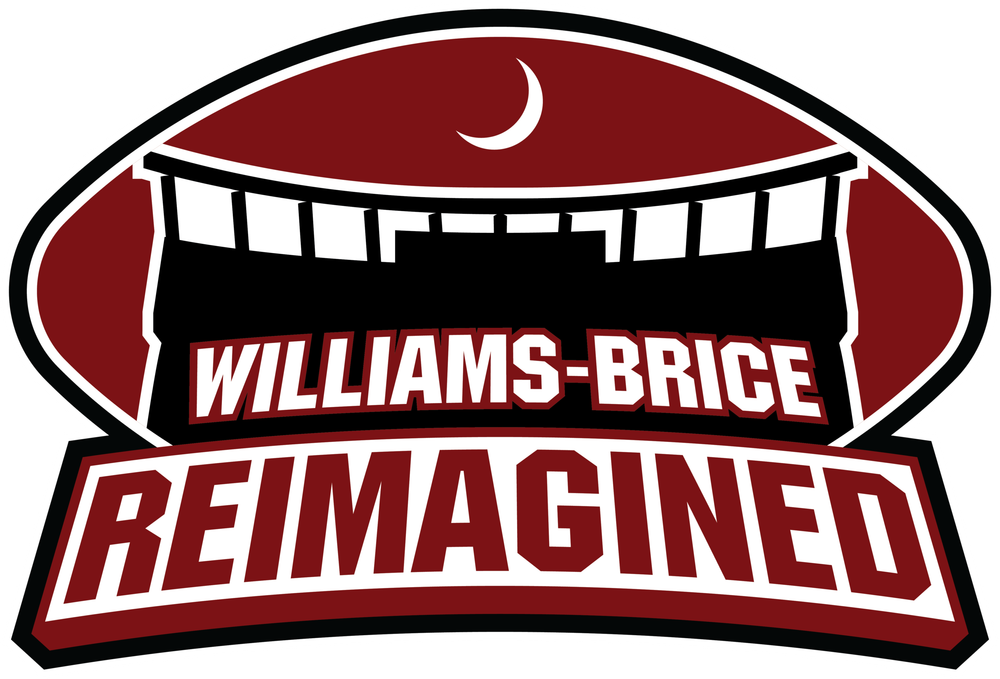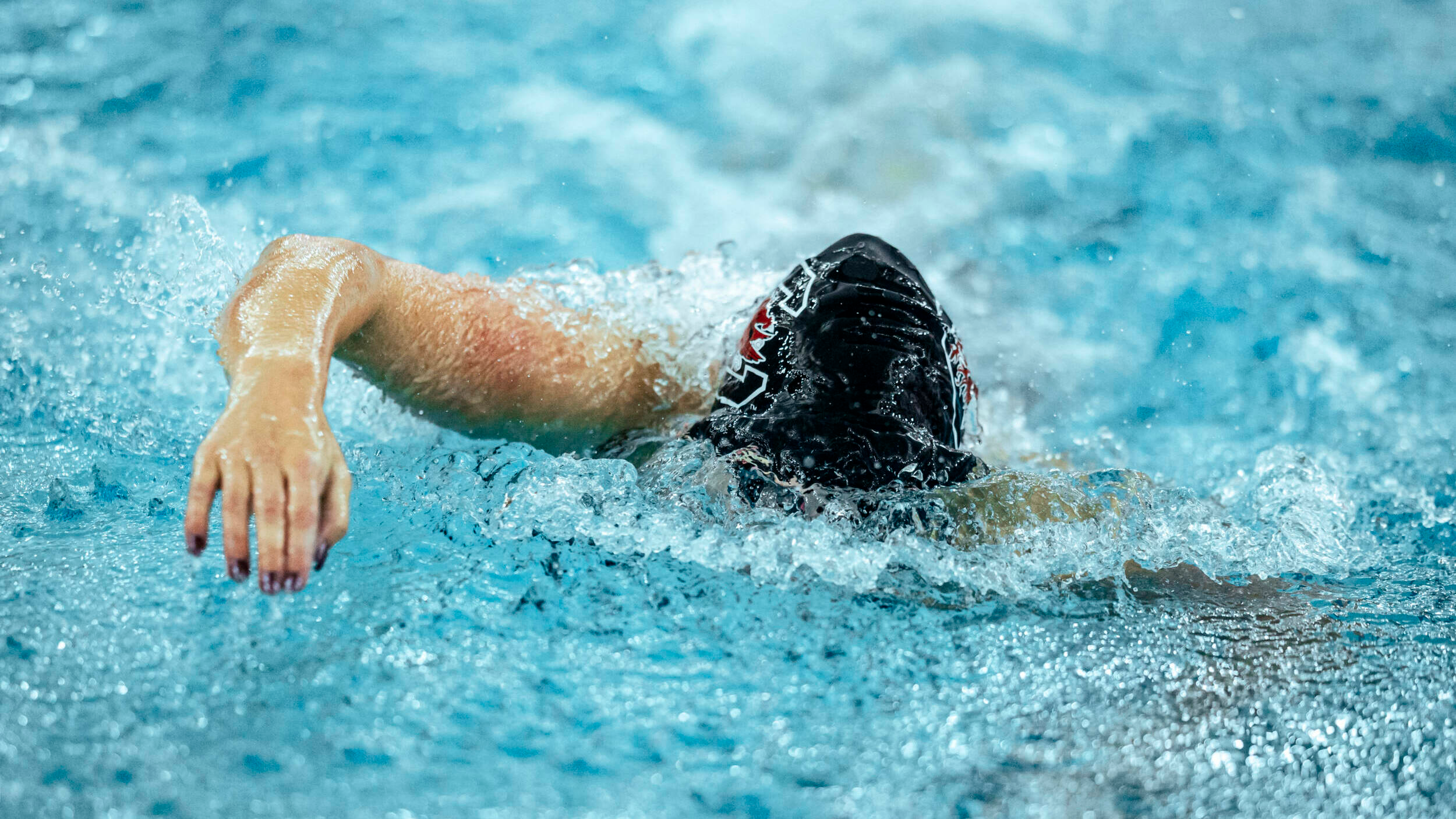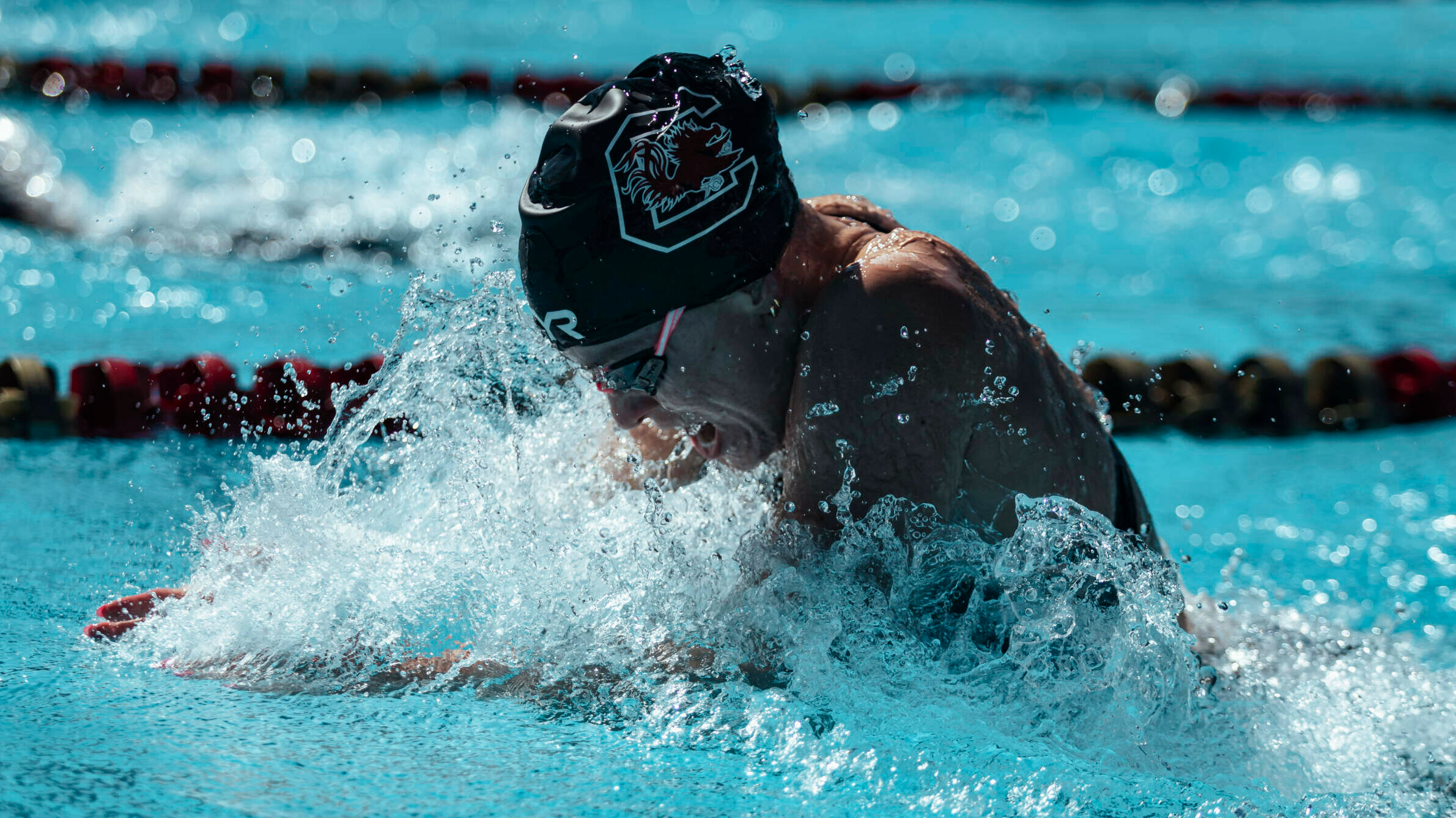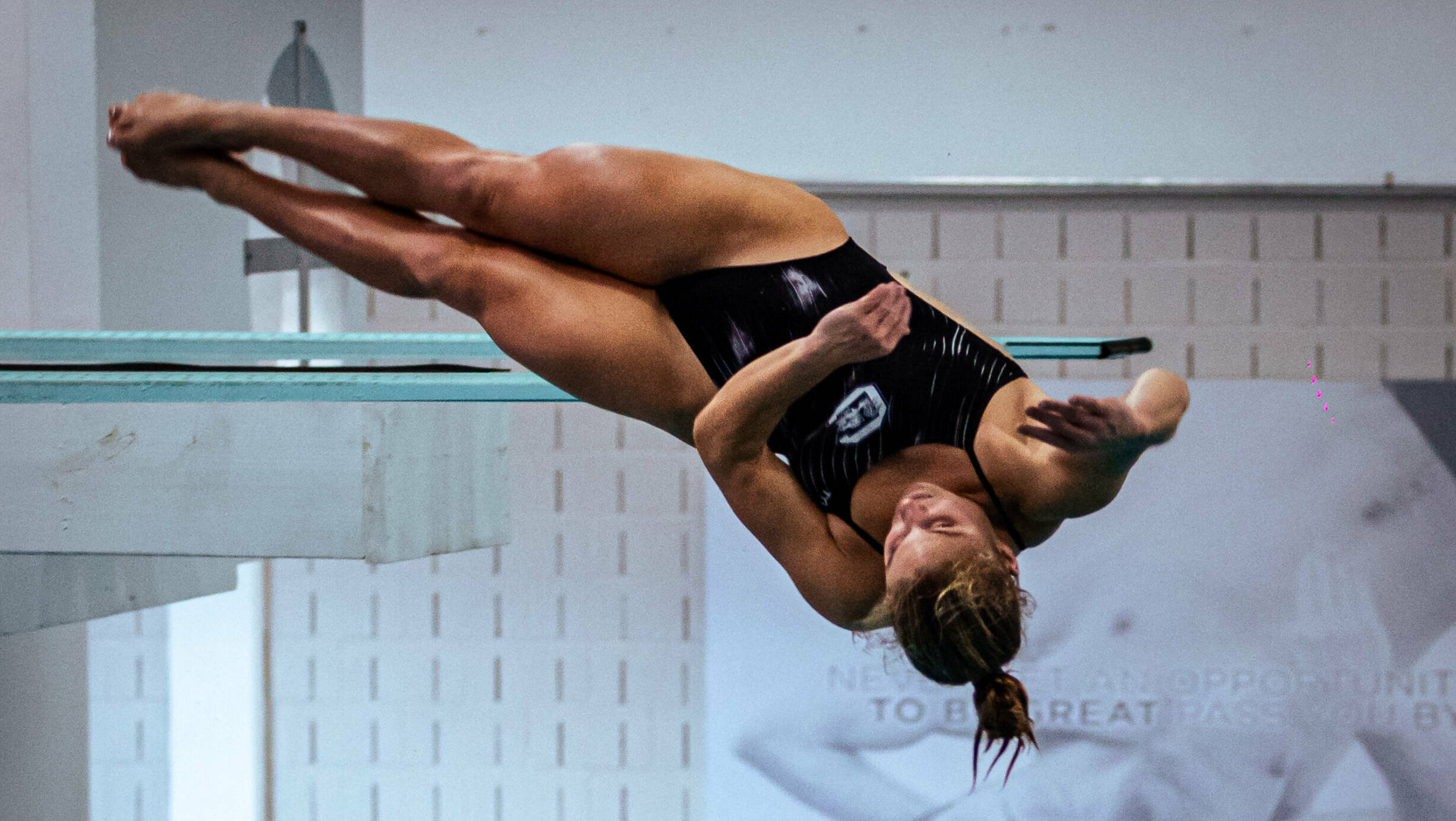
Video: The First 18 - Swimming, Paying It Forward After a Life Changing Opportunity
Oct. 16, 2015
Part 6 of a 6 part series on South Carolina’s first female scholarship student-athletes.
Click here for the full First 18 Digital Presentation with new stories appearing each day this week.
Tina (Hasselberg) Keisling was one of the “First 18” at the University of South Carolina. After the implementation of Title IX, South Carolina made 18 scholarships available for female student-athletes for the first time in school history in 1975, and Keisling (then Tina Hasselberg) was one of the recipients for the swim team. As the university celebrates the 40th anniversary of that milestone, the mother of two children with special needs currently advocates for the equal rights of others through her work with the National Inclusion Project and notes that her place in history had a huge impact on her life after her days as a scholarship student-athlete ended.
“What I am doing in getting recreation facilities to be aware and inclusive of people with special needs is a direct a result of my experience of being a Title IX athlete,” Keisling said. “I was offered an opportunity. I was treated equally, and that just spilled over into my life in all areas. I’m so very grateful that I was part of this.”

Keisling, now 59 years old, lives outside of Philadelphia. She still competes in U.S. Masters Swimming events and has completed several triathlons. Originally from Bethel Park, near Pittsburgh, Pa., she is proud to have earned her South Carolina degree in 1979 and knows that her life could have been a lot different without that scholarship.
“It gave me the opportunity to go to school,” Keisling said. “Up to that point I had been saving money to go to community college. I’m one of eight children, so I didn’t think I’d have the opportunity to go away to school. It was wonderful.”
Three scholarships were awarded in 1975 to each of the six women’s programs which had come under the supervision of the Athletics Department the previous year. The opportunity to compete in athletics at a high level exposed her to many learning experiences that extend beyond the arena.
“It changed the direction of my life,” Keisling said. “Being able to continue with sports just meant everything to me. I learned the values of being on a sports team such as teamwork, cooperation, never quitting and having the experience of meeting people from other parts of the country. I developed comradery with the people I would swim with every day. I was able to travel to other parts of the country. I just learned so much from those experiences. I’ve kept all that with me as my life has progressed. I don’t give up. I’m a fighting Gamecock; I won’t stop or quit. I don’t know if I would be that way if I went to community college. I’m very happy with the way things turned out.”
Change and acceptance don’t always create smooth transitions, but Keisling felt that she and her fellow female scholarship recipients were well-received.
“I felt very welcomed,” Keisling said. “The girls and the boys on the swim team worked out together, and we just became a family. I didn’t know a single soul when I got down there, and right away I had a group that was around each other all the time. I never felt alone, and college can be a lonely place if you don’t have a group to identify with.”
While the student-athletes in 1975 may not have had all the amenities that today’s Gamecocks enjoy, Keisling did appreciate the access to health care to address some respiratory issues with asthma.
“When we went to the infirmary, the people on scholarship were allowed to go to the front of the line,” Keisling recalled. “So that was nice. As far as other stuff, the only things we were allowed to keep were our swimsuit and maybe our swim cap. The robes and sweat suits that we wore all had to be returned.”
This was a good time to be a swimmer at South Carolina as Keisling and the other Gamecocks were excited to compete in the new Carolina Natatorium.
“My first year, that facility was brand-spanking-new,” Keisling said. “Most of the time, our meets were combined with the boys, so we would have some pretty good crowds. It wasn’t going to be the draw like basketball or football, but there were enough people in the stands who certainly helped us out.”
They have so many opportunities that we didn’t have… So I can look back and say, yes, it is pretty cool that I was one of the first. It means more to me now.
Tina (Hasselberg) Keisling
Staying Grounded
Keisling and the others who were among the “First 18” were in unchartered territory. While they were the first to have benefits that their predecessors in women’s sports did not, they also did not have a frame of reference for their experiences. Still, Keisling noted that she did not fully understand her place in history until later in life.
“We didn’t feel like we were a big deal at the time,” Keisling said. “You’ve got practice in the morning before class, and then practice again after school. You had meets at night and on weekends. We just got right into the grind. The only time I felt special is when I didn’t have to wait in line to see the doctor. To tell you the truth, I didn’t realize the impact that we would have. I felt bad because some of the older swimmers weren’t on scholarship, and I thought a lot of them were better than me when I was a freshman. I was just lucky. I was in the right place at the right time. I didn’t feel superior to anyone else. I felt extremely fortunate.”
As time went on, she better understood and appreciated the significance of her experience.
“Young girls now have equal opportunities,” Keisling said. “They have so many opportunities that we didn’t have. There were only a few sports we could play back in my day. Now, these girls can do anything. They have a choice now. So I can look back and say, yes, it is pretty cool that I was one of the first. It means more to me now.”
Women’s college athletics has grown tremendously over the last 40 years. With that perspective, Keisling has a sense of duty when it comes to making sure young women today fully understand their history.
“I used to be a swim coach, and I would talk to some of my student-athletes about Title IX,” Keisling said. “Some of them didn’t know anything about it. It’s important for girls to know that it wasn’t always like this, so don’t take it for granted.”
Paying it Forward
Keisling is now a retired physical education teacher, who still keeps her feet wet, both literally and figuratively. She teaches private lessons and works with triathletes. She also volunteers as an advocate, helping parents of special needs children get services that they need.
“I didn’t think I’d ever be doing this kind of work,” Keisling said. “When life started throwing me curve balls, I became an advocate helping other families navigate the complicated world of special education. I have two children with special needs who are both in their twenties now. I think sports taught me that things don’t always work out the way you want, but you don’t quit. You figure it out. You educate yourself, and you don’t quit.”
In educating herself and working to get children the services they needed, she felt it would have been pointless if she didn’t share her knowledge and help others in similar situations. She has taught classes to parents about advocating for their needs and how to communicate with their local school districts as well as local recreational facilities, promoting the inclusion of people with disabilities in a recreation environment. Her hard work paid off in securing a grant to put toward the National Inclusion Project, which promotes children and adults with disabilities so that they can be included in course offerings at YMCA’s and other recreational facilities.

“We try to let parents know that you can walk into a YMCA and request for your child to be in a regular swimming class, and they have to be aware that they have to provide those,” Keisling said. “As a volunteer, I have worked hard to set up Integrated Member Services at our local YMCA. The goal of IMS is to welcome and allow children and adults with disabilities to experience all the course offerings and opportunities that non-disabled members enjoy, no longer being limited to ‘special’ segregated offerings like ‘adapted swimming’ or a select cheerleading squad or basketball team just for children with special needs. If the individual happens to need support in order to participate with typical peers, in the majority of those cases, accommodations are obvious, relatively inexpensive and easy to implement.”
Her efforts made it possible for a representative from the National Inclusion Project to train more than 70 staff, teachers and volunteers. This resulted in a huge increase in the number of children and adults participating in activities with typical peers.
“Looking back I think my efforts with IMS follow directly from my personal experience with Title IX,” Keisling said. “I hope I have furthered the promise that, regardless of our differences, we deserve equal opportunities and a chance to thrive in an inclusive setting.”
As the decades have passed, South Carolina has enjoyed a great history of success in women’s athletics. The 2014-2015 academic year was a shining example with the women’s basketball team reaching its first NCAA Final Four, the women’s soccer team advancing to its first NCAA Elite Eight, and the equestrian team winning its third national championship. It is only fitting that those, and other Gamecock women’s programs, continue to rise as the university celebrates the 40th anniversary of the first scholarships offered to female student-athletes.












